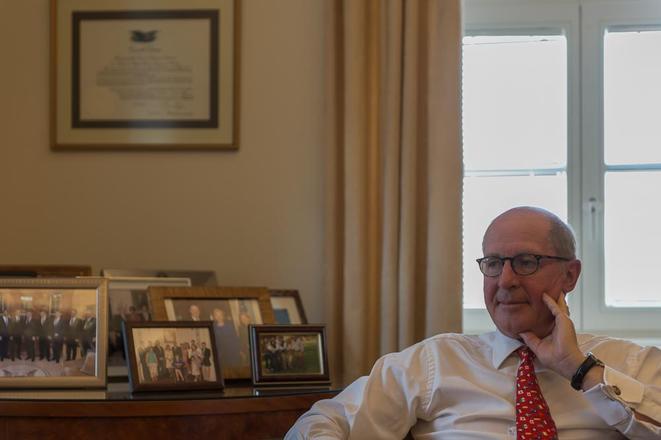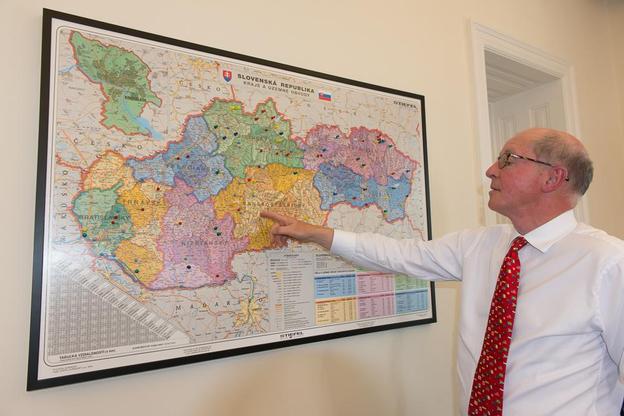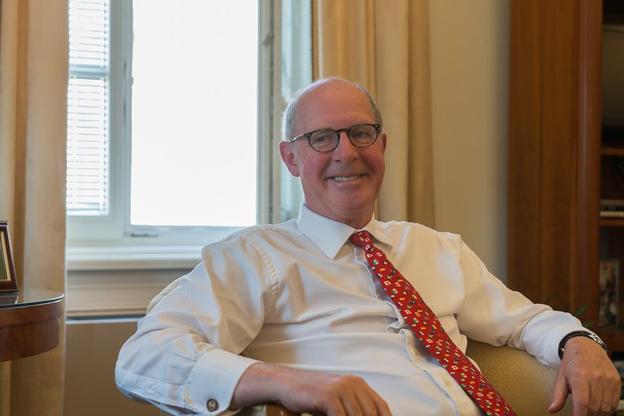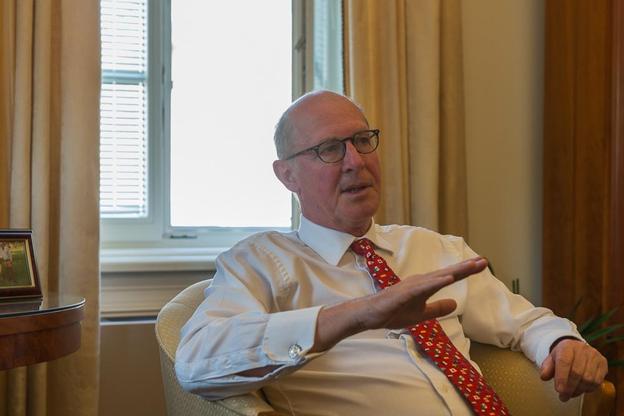In a farewell interview shortly before his departure, Ambassador Sedgwick spoke to The Slovak Spectator about those challenges, among them the negotiations over the Transatlantic Trade and Investment Partnership (TTIP) free trade agreement, but also about the things he will miss most from his time in Slovakia.
The Slovak Spectator (TSS): You are about to leave Slovakia. How do you view your time here, and what were the highlights?
Theodore Sedgwick (TS): I’ve been here for a long time, and it’s been a wonderful experience. Some of the activities I’ve been interested in were promoting entrepreneurship. Our programmes to promote women’s entrepreneurship have been very successful, and I’m very proud that this is continuing. In the military area we’ve been strengthening the relationship between Slovakia and the United States, which was always very strong, but the Black Hawk [helicopters] sale brings it to a higher level. US companies here have been very important to Slovakia, and we’ve done a lot of work for them. Also we’ve been very active with the government in trying to promote a healthy business climate, fighting corruption, but also making the climate good for American businesses, because if it’s good for American businesses, then it’s also good for the economy here. In particular I’m very happy that in eastern Slovakia, where unemployment is quite high, a lot of American companies, like AT&T or IBM, have been increasing their presence. We’ve been working on the very difficult and challenging Roma issue, and also with non-governmental organisations. Together with the good team that I have here we’ve been able to accomplish a lot. And Slovakia has been a good partner.
TSS: One of the things that you have focused on here in Slovakia is the fight against corruption. Have you seen progress?
TS: I’ve seen some progress. In the area of judicial reform it’s very positive that you have new leadership of the Supreme Court and the Judicial Council. We’ve been working with them to introduce ethics courses, and the judicial academy has been very open. In the area of corruption, the American Chamber of Commerce (AmCham) has taken the initiative on the anti-corruption package together with many other chambers of commerce and also with some of the employers, and I’m pleased that the government is planning to adopt the package of reforms they came up with, without making a lot of changes.
The real problem is that there are so many people out there that everybody knows have been guilty of some kind of corruption, but they are walking free. Former politicians, former businesspeople, existing businesspeople. Everyone knows about the corruption but none of them seem to go to jail. We have a lot of corruption in the United States, but the difference is that we prosecute and convict. In 2013 more than 600 US officials were investigated for corruption, and in the last 22 years 11 members of just the House of Representatives were convicted of corruption. I don’t think that the public will take the government’s efforts seriously until they see that some very high-level people are prosecuted, convicted, and go to jail.
TSS: Do you mean the public pressure needs to be stronger?
TS: Definitely in the case of the US it is the public pressure that the government responded to that led to all these prosecutions. The public needs to demand better results. I hope that we in the United States can be something of an inspiration to a country like Slovakia in this area. When I talk to Slovaks, often I find this attitude: ‘This is inevitable, there’s nothing we can do about it’. And I don’t think that’s true at all in any country. This country, by and large, is a successful parliamentary democracy with a strong economy. We know there are these deficits, but basically the country has achieved much in a very short period of time. I hope the people of Slovakia can appreciate they have the power; that they can, if they want, influence things, because democracy only works if people participate.
TSS: How do you perceive the ongoing negotiations between the EU and the United States on TTIP?
TS: We need to do a better job explaining TTIP so that the average person here in Slovakia can understand the benefits. There is a lot of misunderstanding about TTIP. I think that certainly for a country like Slovakia it is a no-brainer. Did Slovakia benefit from opening its economy to the EU? I would be surprised if anybody were to say no. So you opened up the market to 500 million people. Now what if you opened up the market to 800 million people. Would that be beneficial or not?
Everybody in Europe and the United States agrees that the sector that will most benefit is the automotive sector. Slovakia is the largest producer of cars per capita in the world. So this will have a positive impact for Slovaks. There’ve been very positive predictions even by the EU Commissioner for trade about it increasing up to 100 percent. Even if it was half or a quarter of that, that’s still a big increase for European exports of cars to the United States. And then there is a misunderstanding that this is only going to benefit the big corporations, but let’s look at the automotive companies alone. If you go to the factories and you see all those little suppliers around the factories, they’re all SMEs owned by Slovaks. All these SMEs will benefit. So we need to do a better job of explaining to the public the myths that are not true.
I think that it will be successful, it’s just going to take a long time, because there are political issues both in the EU and the United States. There’s a very robust debate in our country as well as in Europe. One of the myths is that labour, environmental and food safety standards are going to be lower. Both sides have agreed that’s not going to be true, they’re going to be strengthened. The U.S. President is working very hard, this is his top priority right now, the trade promotion authority for TTIP. So it’ll take some time; all these trade agreements are very complicated, thousands of pages. Also, there are many questions about transparency. Everybody I know involved in these negotiations says this is the most transparent negotiation in history. On the European side, the entire text proposed by the Europeans is on a website. So if somebody has some allegations, they can go to the website and see if they are fabricated. I’m optimistic that the public in the United States and in Europe will go in the right direction on this. It’s very clear that employment and the economy will grow on both sides.
TSS: One of the goals of the EU in terms of TTIP is easing flows of liquefied natural gas (LNG) and crude oil from the United States to the EU, and this is also supported by EU Energy Commissioner Maroš Šefčovič. What are the chances this is fulfilled?
TS: Slovakia is lucky to have such a strong leader in such an important position. He’s a very capable public servant. Export terminals in the United States are being built, so we are responding to the need in Europe. In fact, several export terminals have already been approved and the first one is slated to be completed by the end of this year. And they already have contracts for LNG in Europe, so I think that’s very positive. There’s a difference on this position right now. The Europeans would like to have a separate chapter on energy. There are many good reasons for this. The United States is saying that the issues are covered under the existing text. This will work out in the end, because it’s not a fundamental disagreement. But even without the agreement the market is moving.
I don’t think that American LNG is going to be a panacea for Europe. It’s not going to be a great solution that will solve everything, because it is expensive. On the other hand it is surprising how cheap it is that it’s even competitive now, there are contracts in France and in Spain. In the longer term, it will be important hopefully as a swing supplier. The more competition there is, the better. I don’t think the United States is aiming to be the major supplier for Europe, because it is a long way to travel for the gas, but we are producing it so cheaply that it could be a good option for some countries. That’s the way we look at it. It’s a geopolitically important issue too. It’s important that all countries have choices, that they are not dependent on a single supplier. So if we can provide an alternative, so much the better.
TSS: Slovakia has already become home to several shared service centres, of which several have parent companies in the United States. Why do these companies opt to base their service centres here? What should Slovakia do to attract investments with higher added value?
TS: They’ve been here for a long time and I think this is a great story for Slovakia and for the United States. Because when you look at the short modern history of Slovakia, when you think about it, really you lost those first years when the economy actually went backward, and then in 1998 came the reforms which overnight brought the auto companies. But the story then was “OK, we’re going to be a low-cost manufacturer”, so that’s why the automotive companies came. And now the story is “look, we have skilled labour”. With the low-cost solution there’s always a risk that those jobs could be co-opted and travel to some lower-cost place further east or on some other continent. That’s what we call the race to the bottom and that’s not a race you want to participate in. But in the race to the top, you have an educated workforce and American companies like it here because they’re getting skilled workers who graduate from the technical universities in Bratislava and Košice. It’s very important for Slovakia to make sure it is investing in these technical universities to provide the workers that are needed in the shared service centres. It would be a very good investment for the economy to invest in education where these companies will continue to benefit.
It’s amazing that every big American IT company you can think of is here. Dell has the largest centre in Europe here. And then these other companies like Johnson Controls, they started with very few people, and now they have 6,000 people here. Often I’m asked to bring new companies here. But I think it’s important to make the environment attractive for the companies that are already here, who are expanding. If you have a company that’s adding a few hundred jobs that’s better than a new factory which will bring a hundred jobs. I talk to these companies all the time, they’re very happy about the quality of the workers. They’re concerned about some of the labour standards, rules, and some of the tax policies. But as far as the quality of workers is concerned, they’re very happy. Slovaks are very skilled and hard-working people.
TSS: Which other sectors of Slovakia’s economy are or might be interesting for US investors?
TS: I’ve been very impressed with the whole start-up phenomenon here. Recently the government approved a programme to encourage more start-ups. I think you’re going to see a lot of these companies have offices here and also in Silicon Valley. And this relationship could be very dynamic. And then smart American companies are here and want to incubate some new ideas that they can then transfer back to the United States. This is the way the world is going. Something that can be created here can be applied back in the United States. I think it’s important to look at the existing manufacturing base in Slovakia and try to figure out how we can promote innovation in existing sectors, for example in the auto sector. The flying car is perfect, because it builds on the strength of the company.
Innovation is critical for the future of the car business. As long as the car manufacturers that are here feel they are innovating all the time, they’ll stay here. But I think it’s important to pay attention to the existing manufacturing companies, like U.S. Steel, and make sure the policies are attractive for them, because this is the biggest employer in the entire country. I talked to the U.S. Steel management and they’re very excited to think of themselves as a technology company, as much as a manufacturing company. Košice is the only plant outside North America where they can do a lot of the innovation here that will even benefit them back in the United States.
Slovaks are very good with repairing, fixing, but they’re also good at these skilled jobs, like programmers. They’re also incredibly creative. Definitely the IT sector is an area where, if the country is producing enough skilled workforce, this can be a very good sector. For the most part, education is very well aligned with the market. I think there’s a good debate going on about trying to align the jobs with the education. I’m very optimistic about Slovakia. It’s a small country but with the start-up agenda it can be even more dynamic. Look at the results: 3.1-percent growth in the first quarter; that’s perhaps the highest in the eurozone. Very impressive.
TSS: You arrived to Slovakia in 2010, the year when the first Rainbow Pride took place in Bratislava. The US Embassy has been a supporter of the event all these years. Have you noticed a significant shift of public perception of LGBTI community?
TS: Of course there’s still a lot of prejudice but that was the same in my country. Most people were very much against anything that would not promote the traditional family unit. What happened over time is, people would have a niece or a nephew, or a son or a daughter, who had a different sexual preference. They would look at them and it would be difficult for them to have a policy which would hurt their own family. That’s what happened in the United States. People have become much more tolerant. In the United States it is not universal, each state makes up its own mind, but more and more, states are approving gay marriage and rights. Obviously, Slovakia is a largely Catholic country, so maybe this is a more significant issue. On the other hand, the Pope said that this should not be the main issue of the Church, and we shouldn’t elevate the gay rights agenda to be so hostile. I think this is the direction the country will go, although there is still some distance to go.
TSS: In the past, you were among the diplomats who used to attend selected court hearings, thus drawing attention to the state of judiciary and rule of law in Slovakia. What is the situation now?
TS: I don’t think there have been any disciplinary hearings we would be concerned about. This was a way we as an embassy had for observing what’s going on in Slovakia and frankly, there were some concerns that the disciplinary hearings were somehow used almost as a political tool. But this has dramatically improved.
TSS: So this is not an issue anymore?
TS: Not that I can tell. I talked to both the women who are heading the Supreme Court and the Judicial Council and I think they understand that the public has a very low trust in the judiciary and they want to do what they can, to build that trust. If you’re a judge, you should be proud to be a judge. You shouldn’t be ashamed. Sometimes you get the impression that the whole system is corrupt, but I don’t think that’s true. There are certainly some corrupt people in the judiciary. There have been some problems with getting competent judges, problems with nepotism, but the judiciary is hopefully heading in a positive direction.
TSS: The Slovak army recently approved the purchase of American Black Hawk helicopters. How does this affect cooperation in defence?
TS: The reason that we’re so happy about it is that the way this particular transaction works, under the Foreign Military Sales programme, the U.S. military buys hundreds of Black Hawks for the Pentagon, and Slovakia gets the same price. The other great thing about it is that it’s not just selling aircraft, it’s a whole package that includes training, spare parts, maintenance. There are no hidden costs in it. In other words, it’s really delivering a whole capability. As a NATO ally we’re very happy that a NATO member is modernising its defence and buying equipment that is compatible with NATO. And of course it’s a very transparent transaction. There are no hidden fees, no middlemen, nobody on the side benefiting from this. It’s really, what you see is what you get.
TSS: You are traditionally taking part in the annual volunteering event Naše Mesto. What is the attitude of Slovaks to volunteering? Has it come any closer to that of people in the United States, where volunteering has a much stronger tradition?
TS: There are some cultural differences. I can understand why volunteering here is maybe not as prevalent as in the United States. During communism the state handled everything so there was no initiative to volunteer. But even in the European context the idea that the state will handle things, is much more present than in the United States. There’s a big difference in the traditions. Volunteerism really is good not just for the community but also for the person who’s doing it. It gives you a positive feeling. I’ve been amazed by the number of NGOs in the country and the number of volunteers who go out in the Roma communities. Naše Mesto is catching on. I think there’s a positive trend, and I hope the United States can be a role model for that. Slovaks have big hearts. That’s why I say it’s important for people to feel they can change the community in a positive way, be it through politics or through volunteering.
TSS: What will you miss most about Slovakia when you leave?
TS: I’ll miss everything about Slovakia. One thing I love about Slovakia is that all the things I love to do in the United States, I can do even more here. I love skiing, I can go skiing close by. I like playing tennis, I have many good tennis partners in Slovakia. I like biking, and all the outdoor things that Slovaks like to do. But mainly I’ll miss the people because I’ve made a lot of good friends here, and also the friendliness of the people. Even though I’ve been here for five years, there are still places in Slovakia that I haven’t been to and I’d love to go to. For example Slovenský Raj. I’ve driven through there and I really want to go to hike through the waterfalls. There are reasons to come back.



 US Ambassador Theodore Sedgwick (source: Jana Liptáková)
US Ambassador Theodore Sedgwick (source: Jana Liptáková)
 Ambassador Sedgwick reviews his visits around Slovakia. (source: Jana Liptáková)
Ambassador Sedgwick reviews his visits around Slovakia. (source: Jana Liptáková)
 TTIP is a no-brainer for a country like Slovakia. (source: Jana Liptáková)
TTIP is a no-brainer for a country like Slovakia. (source: Jana Liptáková)
 The judiciary is hopefully heading in a positive direction. (source: Jana Liptáková)
The judiciary is hopefully heading in a positive direction. (source: Jana Liptáková)